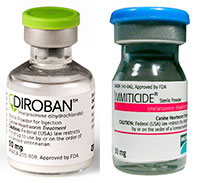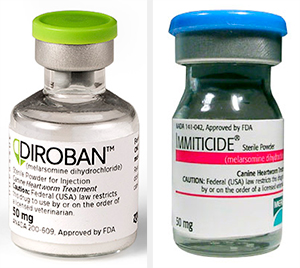

Photos courtesy of Zoetis and Merial
The debut of Diroban, a generic form of melarsomine, brings the prospect of relief from ongoing shortages of Immiticide, which had been the only medication approved by the FDA to kill adult heartworms in dogs. Prices of the brand-name and generic products are comparable.
There is a reason advertisements for Diroban, a new generic canine heartworm treatment sold by Zoetis, drive home the notion of “reliable availability.”
Diroban is a copy of Immiticide (melarsomine dihydrochloride) from Merial, which until now has been the only medication approved by the U.S. Food and Drug Administration to kill adult heartworms in infected dogs. Supply of Immiticide has been rocky for years, with intermittent shortages leading to backorders, rationed distribution, anxious clients and fears of health consequences in untreated dogs.
Now the prospect of steady access to melarsomine seems strong. Diroban is on the market following FDA approval, announced by the regulatory agency on Feb. 17. Zoetis spokesperson Colleen White said the company does not expect order limits.
“Zoetis is committed to addressing unmet needs in the marketplace,” White said by email.
Moreover, it appears Merial’s Immiticide supplies also may solidify. Merial had chronic problems with its U.S. melarsomine manufacturer, which shut down in 2013. Federal regulators have been allowing Merial to import limited amounts of non-FDA-approved Immiticide from the company's European supplier to address shortages in the United States. As a consequence of the restricted supply, only veterinarians with heartworm-positive dogs can obtain the drug; it's unavailable to practitioners wanting a supply on hand for prospective patients. The stop-gap solution soon will be replaced by a long-term solution: the FDA has approved a new Immiticide manufacturing facility for Merial.
“Merial expects to return to full supply later this year,” company spokesperson Demitra Wilson told the VIN News Service by email.
Dr. Mark Rishniw, a cardiology consultant for the Veterinary Information Network, an online community for the profession, expects that the changes will mean less hassle for veterinarians.
“It’s always nice to have two companies making it,” Rishniw said, “because if one company has trouble manufacturing, hopefully the other will step in and cover that. It certainly should help to maintain a more stable supply.”
In the past, shortages sometimes meant veterinarians had to prioritize the most urgent cases. Veterinarians who worked at shelters were concerned that untreated dogs would not get adopted, and some who wanted to treat dogs with melarsomine before clinical signs presented were frustrated when Merial rejected their orders. Because of its production woes, Merial implemented a needs-based system to distribute its limited supplies.
Treatment options were limited, too. Alternate protocols such as “slow kill,” which involves prolonged use of heartworm preventives, are not approved or recommended by the American Heartworm Society (AHS).
“In any drug shortage, dogs are going to be suffering as a result, or maybe even dying,” Rishniw said, “especially for shelter animals and similar cases where they could potentially be dealing with quite a lot of cases of heartworm infection and having to prioritize or ration how they administer [the available drug].”
Veterinarians who hoped the debut of generic melarsomine would mean cheaper prices, which typically is one of the primary benefits of generic drugs, might be disappointed, at least for the time being. When Dr. Robin Hertel, who practices in New Hampshire, checked prices recently, he was quoted the same price for Diroban as Immiticide: $221.10 for a box of five vials. (Zoetis is offering a 15 percent discount on Diroban through April 28.)
One difference between sales of the two drugs is that Immiticide is available only from Merial, while Diroban can be carried by all Zoetis-approved distributors. White of Zoetis said distributors are MWI, Midwest Veterinary Supply, Patterson Veterinary, Henry Schein and Hawaii Mega-Cor.
By shopping around, veterinarians might be able to find a better price. Dr. John Daugherty, who practices in Ohio, found prices as follows: Diroban for $201.58 through Patterson, $237.13 through Schein, and Immiticide from Merial in between, at $232.46.
Until Merial shores up its supply or other generics emerge, it is hard to say if competition will produce lower prices.
Unlike in the human drug market where sales of generic drugs far outstrip brand-name drugs by volume, generics make up a small fraction of veterinary pharmaceutical offerings, although reportedly, that's beginning to change.
Not to be confused with “generic name,” which refers to the drug’s active ingredient, generic drugs are, according to the FDA, identical to their brand-name counterparts “in dosage form, safety, strength, route of administration, quality, performance characteristics and intended use." Once the patent for a brand-name drug such as Immiticide expires, others may seek approval for a generic version. An FDA spokesperson said regulatory review involves an “abbreviated” application process that requires submission of less information than applications for approval of brand-new drugs.
The generic must be bioequivalent to the brand-name drug, meaning the active ingredient is absorbed by and becomes available to work in the body at the same rate.
Diroban’s drug sponsor, or entity that developed the drug, is Anzac Animal Health, a company based in Missouri that focuses on injectable products. It opened in 2012, according to the Missouri business registry, and has a subsidiary in Canada under the same name.
Dr. Christopher Rehm, AHS president, said the society does not recommend one drug over the other. But he echoed Rishniw’s sentiment that the availability of a second heartworm adulticide product is good news for veterinarians.
“Diroban is an FDA-approved product, and it should be beneficial to practitioners to have two independent sources of melarsomine, which is the only compound approved for treatment of heartworm infection in dogs,” Rehm said.
Preventing heartworm disease is relatively simple. Multiple products composed of a variety of active ingredients are available to prevent heartworm infestations in dogs and cats. Treating heartworm infection is another story.
Heartworm, or Dirofilaria immitis, is a parasitic roundworm that grows to about a foot in length at maturity. The parasite is spread by the bite of infected mosquitoes. Infection potentially is fatal: Worms live in the heart, lungs, and blood vessels of infected animals, and can cause severe lung disease, heart failure and organ damage.
During treatment, the patient’s exercise must be restricted because an elevated heart rate increases the risk of blood vessels being blocked by fragments of dead worms. AHS guidelines include a 60-day pretreatment with doxycycline and heartworm preventive medications before three melarsomine injections.
Rehm noted that pretreatment is recommended even when melarsomine is readily available.
Dr. Skip Fix, a practitioner in Houston, has had to ration Immiticide in the past. These days, he treats about six dogs per month for heartworm, he reported by email.
“I have usually had supply when needed, but we do try to schedule [treatment of] multiple dogs so none goes to waste, just in case we cannot get replacement doses,” he said.
Fix noted that Immiticide injections are painful. The arsenic-based compound is delivered in the lumbar region, and swelling and tenderness are common side effects. Although it seems unlikely that Diroban, being a generic copy, will be different, Fix’s criteria for whether he will use it is simple: “If the new stuff is cheaper and less painful, I will make the switch.”